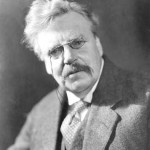I have known some people of very modern views driven by their distress to the use of theological terms to which they attached no doctrinal significance, merely because a drawer was jammed tight and they could not pull it out. A friend of mine was particularly afflicted in this way. Every day his drawer was jammed, and every day in consequence it was something else that rhymes to it. But I pointed out to him that this sense of wrong was really subjective and relative; it rested entirely upon the assumption that the drawer could, should, and would come out easily. “But if,” I said, “you picture to yourself that you are struggling against some powerful and oppressive enemy, the struggle will become merely exciting, and not exasperating. Imagine that you are tugging up a lifeboat out of the sea. Imagine that you are roping up a fellow-creature out of an Alpine crevass. Imagine even that you are a boy again and engaged in a tug-of-war between French and English.” Shortly after saying this I left him; but I have no doubt at all that my words bore the best possible fruit. I have no doubt that every day of his life he hangs on to the handle of that drawer with a flushed face and eyes bright with battle, uttering encouraging shouts to himself, and seeming to hear all round him the roar of an applauding ring.
An adventure is only an inconvenience rightly considered. An inconvenience is only an adventure wrongly considered.
…and he plays exactly as real children play. At least he thinks so, and it is one of the pathetic things about him that he often plays quite wrongly.You see, he had no one to tell him how children really play…even the ducks on the Round Pond could not explain to him what it is that makes the pond so fascinating to boys…he often played ships at the Round Pond, but his ship was only a hoop which he had found on the grass. Of course, he had never seen a hoop, and he wondered what you play at with them, and decided that you play at pretending they are boats. This hoop always sank at once, but he waded in for it, and sometimes he dragged it gleefully round the rim of the pond, and he was quite proud to think that he had discovered what boys do with hoops.Another time, when he found a child’s pail, he thought it was for sitting in, and he sat so hard in it that he could scarcely get out of it. Also he found a balloon. It was bobbing about on the Hump, quite as if it was having a game by itself, and he caught it after an exciting chase. But he thought it was a ball, and jenny Wren had told him that boys kick balls, so he kicked it; and after that he could not find it anywhere.Perhaps the most surprising thing he found was a perambulator…and Peter approached it warily, for the birds had never mentioned such things to him. Lest it was alive, he addressed it politely, and then, as it gave no answer, he went nearer and felt it cautiously. He gave it a little push, and it ran from him, which made him think it must be alive after all; but, as it had run from him, he was not afraid. So he stretched out his hand to pull it to him, but this time it ran at him, and he was so alarmed that he leapt the railing and scudded away to his boat. You must not think, however, that he was a coward, for he came back next night with a crust in one hand and a stick in the other, but the perambulator had gone, and he never saw another one…Do you pity Peter Pan for making these mistakes? If so, I think it rather silly of you. What I mean is that, of course, one must pity him now and then, but to pity him all the time would be impertinence. he thoguht he had the most splendid time in the Gardens, and to think you have it is almost quite as good as really to have it. He played without ceasing…Oh, he was merry…sometimes he fell, like a spinning-top, from sheer merriment. Have you seen a greyhound leaping the fences of the Gardens? That is how Peter leaps them.


